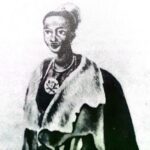SIBTHORPE, AARON B. C.
- 3 Min Read
Aaron Belisarius Cosimo Sibthorpe (circa 1840-June 20, 1916) was the first historian of Sierra Leone. He was probably brought to Sierra Leone as a boy, on a slave ship, as a receptive, from what is now Nigeria. He grew up at Gloucester village near Free-town. He was educated at the village/school, then at the Church Missionary Society Grammar School in Freetown, and at Kissy Normal School. In 1865 he became a teacher at Christ Church, Pademba Road, Freetown.
He showed artistic promise, and exhibited drawings and models at the Sierra Leonę Exhibition of 1865. Then he turned to writing, and composed two school textbooks, a History of Sierra Leone, and a Geography of Sierra/ Leone. With the help of a visiting school inspector he had them published in London 1868. Both were subsequently revised. Second editions appeared in 1881. A third edition of the Geography was published in 1905, and of the History in 1906.
As a historian he was a pioneer in an uncharted field, showing the world that the Sierra Leone Colony was a distinction country, with an articulate people, proud of their achievements. He seems to have had no access to official records in writing his book, but plainly he read widely in printed sources. Not content with a dull political recital of the type then usual in school textbooks, he enlivened his narrative with details of economic and social life, including lists of commodity prices at successive periods, songs, and proverbs.
His Geography also included descriptions of village handicraft and of the prevalent diseases, information not usually found in school textbooks of the period.
In 1869 he moved to Hastings village, east of Freetown, and spent the rest of his working life as an ill-paid teacher and church catechist there, and in the neighbouring village of Grafton. He became interested in natural history, discovering in the countryside near Hastings plants and minerals which he believed to be of great economic value. He described his discoveries in a manuscript book, “The Latent Riches of Sierra Leone,” but failed to find a publisher for it. Instead he incorporated his descriptions into the later editions of his History and Geography. This gave them a personal, indeed eccentric, flavour that detracted from their use in schools. Some pages were almost entirely given over to details of the author’s own botanical observations. Eventually the schools stopped using them.
Nevertheless, he went on with his scholarly researches; undismayed by lack of recognition and encouragement. He also practiced as a herbal doctor, using medicines of his own making. From time to time he contributed historical articles to the Freetown newspapers. In 1907, at the centenary of the adoption of the Slave Trade Abolition Act, by the British parliament, he delivered an oration which was subsequently published as a pamphlet. In 1909 he published a short book seeking to prove that the Yoruba people were descended from the lost tribes of Israel. But his achievements were little noticed in his homeland. The only public recognition his labours ever received was from a group of Krios (Creoles) in Lagos, Nigeria, who raised a small subscription for him.
On June 20, 1916 he died, and was buried in Kissy cemetery. He was a talented but unrecognised scholar of originality and determination, who lived out his days in humble obscurity, unappreciated by the colonial authorities or by his own countrymen.
CHRISTOPHER FYFE



